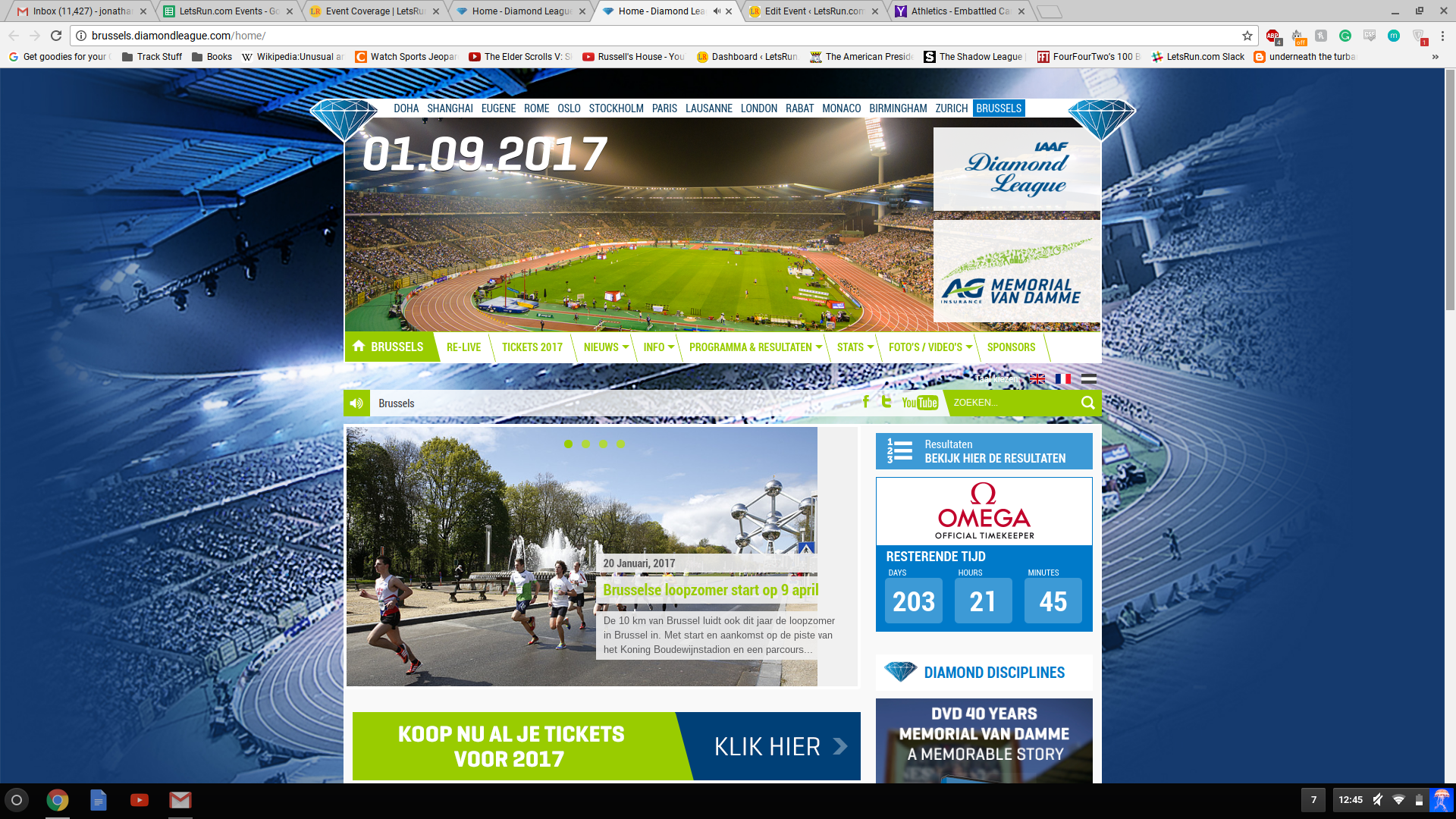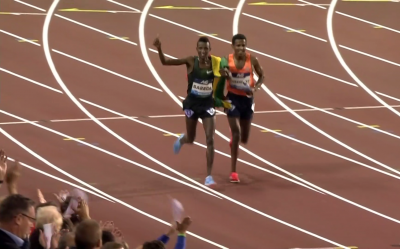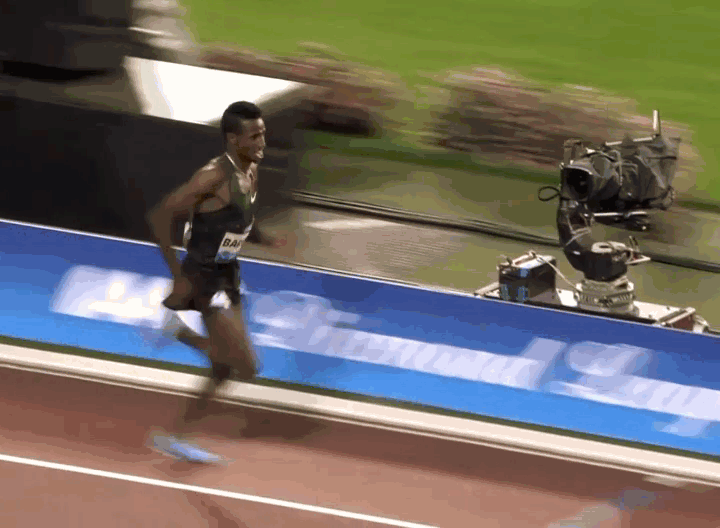Legendary Company: Selemon Barega Runs 12:43 (#4 All-Time) in Brussels to Join Bekele, Geb, & Komen in the Sub-12:45 Club
By LetsRun.com
August 31, 2018
Thank you, Yomif Kejelcha.
Entering tonight’s Diamond League final in Brussels, it looked as if 2018 would come and go without a single man breaking 13:00 for 5,000 meters — the first year without a sub-13:00 since 1993. But Kejelcha, the 21-year-old double world indoor champion, was not going to let that happen. After a blazing first three kilometers of 7:44.6, Kejelcha took it upon himself to continue pushing the pace, and the result was one of the greatest 5,000-meter races in history.
The times were phenomenal: 12:43.02 for winner, 18-year old Selemon Barega — only Kenenisa Bekele, Haile Gebrselassie, and Daniel Komen have run faster. 12:45.82 for runner-up Hagos Gebrhiwet — only Komen has ever run faster and lost. 12:46.79 for Kejelcha — a seven-second PR, and the fastest time ever for a third placer.
Oh, and Paul Chelimo became the seventh American to break 13:00, clocking 12:57.55, which was only good for sixth place tonight. In all, eight men broke 13:00 tonight, only the fifth time in history that has happened.
For the last few weeks, it’s been a popular parlor game in track & field circles to speculate why no one has been able to break 13:00 this year. Has the talent well run dry? Has better drug testing resulted in slower times? Tonight’s race in Brussels showed that no, the talent was still there: it just needed perfect weather and an athlete like Kejelcha to bring it out of everyone.
There were four reasons for tonight’s fantasy times.
1. Perfect weather — It doesn’t get much better than mid-to-high 50s (13-14 C) with almost zero wind. Many Diamond League meetings are run in the middle of the day when it’s hot and windy. Today, the weather was ideal for a 5000 and the results showed. 12 of the 13 finishers ran lifetime PBs (9) or SBs (3).
2. Quality rabbitting — Stanley Waithaka, who towed the field through three kilometers in 7:44.6, had run 13:10 earlier this year and beat Barega to earn silver at the World U20 champs in July. The first lap was too fast (sub-60) but the key is getting to 3k.
3. A field that was actually willing to chase the rabbits — 7:44.6 for 3k is 12:54 pace. That’s obviously doable for several guys in this field, but usually when a rabbit goes out that fast in a Diamond League race, the field backs off — particularly when there is $50,000 on the line for the winner. But Kejelcha was willing to follow the rabbits, and because he did, the rest of the field did as well.
4. Someone willing to keep pushing the pace once the rabbits dropped out.
The really important part to getting incredible times is someone has to do the work when there are no more rabbits. Here’s what we wrote in our Lausanne preview as we lamented the lack of sub-13:00s in recent years:
“To run sub-13:00, you need someone to push the pace in the fourth kilometer once the rabbits have dropped, but there’s no one on the circuit right now who has shown themselves to be confident enough in their kick to do that.”
And Kejelcha, emboldened by his 7:28.00 3,000 in Gothenburg two weeks ago — the fastest time in the world since 2011 — was utterly fearless tonight. Once the rabbits were gone, he began stringing off the laps like clockwork. From 3000 until the bell, Kejelcha went 60.5, 60.2, 61.1, 60.6 — a 4:02.4 1600 split.
But that was not enough to drop Kejelcha or Barega, who were right behind the lanky Ethiopian with 400 to go. Kejelcha dropped the pace at the bell, enough to rid himself of Gebrhiwet, but Barega was still full of run. Just like Hellen Obiri did to Kejelcha’s Nike Oregon Project teammate Sifan Hassan in Zurich yesterday, Barega answered Kejelcha’s move with one of his own on the backstretch, seizing the lead with just over 200 meters to go. By the time he entered the home stretch, Barega was free and clear and used a 55.8 final lap (27.7 final 200) to win in an unfathomable 12:43.02, the world’s fastest time since Kenenisa Bekele’s 12:40.18 in Paris in 2005. Barega’s final 200 destroyed Kejelcha who was passed late by Gebrhiwet for runner-up honors.
Gebrhiwet’s 12:45.82 moved him to #5 on the world all-time list while Kejelcha (12:46.79) now occupies the #7 spot with the great Eliud Kipchoge (12:46.53) sandwiched between them at #6. Kejelcha may be a bit miffed to have lost to Barega tonight, however. Not only did Kejelcha do all the work from 3000 to 4600 meters tonight, but Barega also denied him a shot at sub-13:00 earlier this year in Lausanne, running up on him from behind (leading to a DQ for Kejelcha when he tried to yank Barega’s shorts down in response).
Results (full splits here) 5000 Metres - Men - Diamond Discipline
1 Barega , Selemon ETH 12:43.02
2 Gebrhiwet , Hagos ETH 12:45.82
3 Kejelcha , Yomif ETH 12:46.79
4 Edris , Muktar ETH 12:55.18
5 Hadis , Abadi ETH 12:56.27
6 Chelimo , Paul USA 12:57.55
7 Yator , Richard KEN 12:59.44
8 Molla , Getaneh ETH 12:59.58
9 Ahmed , Mohammed CAN 13:03.08
10 True , Ben USA 13:04.11
11 Abdi , Bashir BEL 13:04.91
12 McSweyn , Stewart AUS 13:05.23
13 Rutto , Cyrus KEN 13:28.25
Kazi , Tamás HUN DNF
Letting , Vincent KEN DNF
Mburu , Stanley Waithaka KEN DNF
|
Quick Take: Tonight’s performance puts Selemon Barega in legendary company
The only three men ahead of Barega on the all-time list are all legends of the sport: Bekele and Geb are generally acknowledged as the two greatest distance runners of all time, while Daniel Komen was quite possibly the most talented runner to have ever lived. They now have company in the sub-12:45 club, and for the first time in years, Bekele’s 12:37 world record doesn’t seem totally out of reach.
Yet despite running 12:43 tonight, Barega amazingly failed to medal at both the World U20 champs in July and the African Championships earlier this month, vastly different races where the winning times were 13:20 and 13:48. Timothy Cheruiyot — whose only losses this year were in championship 1500 finals — has already shown that there’s a difference between winning DL races and winning championship finals, and today was more proof of that fact.
That said, Barega still has room for improvement — as scary as that sounds. He was second in a slow World Indoor final in March (winning time: 8:14), and he’s still only 18 years old officially (East African ages can be suspect, but Barega looks young).
Selemon Barega ?? (18!) 12:43.02 5000m #BrusselsDL
✅ fastest time since 2005
✅ breaks U20 WR (12:47.53)
✅ splits Barega vs Bekele WR
1k 2:32.8 | 2:33.8
2k 2:39.5 | 2:31.9
3k 2:32.6 | 2:31.7
4k 2:31.1 | 2:30.59
5k 2:27.0 | 2:29.42
=
12:43.02 | 12:37.35
➡️ can break WR❗️ https://t.co/P5st16zDqx— PJ Vazel (@pjvazel) August 31, 2018
Quick Take: Yomif Kejelcha deserves major props
Like the sub-13:00 5,000, the sub-8:00 has been a rare sight in recent years — there’s only been one in the world since the start of 2016. But while men like Soufiane El Bakkali and Evan Jager were willing to let the pace lag in the DL final Zurich last night, resulting in an 8:10 winning time, Kejelcha wasn’t going to let that happen — even with $50,000 on the line for the win (Kejelcha wound up earning $10,000 for third).
It takes a lot of guts to start dropping 60-second laps from over a mile out, but Kejelcha was willing to lay it all on the line. Major props to him. If Barega and Gebrhiwet weren’t super fit right now, he’d have a monster time AND an extra $40,000.
Quick Take: Paul Chelimo (finally) breaks 13:00
When Chelimo ran 13:03 in the 2016 Olympic final, it seemed like only a matter of time before he joined the sub-13:00 club. Two years later, he was stuck at 13:03, but he finally got under tonight, running 12:57 for sixth.
That’s a terrific performance, and the first sub-13:00 by an American since Bernard Lagat’s 12:58.99 on the same track five years ago.
At the same time, Chelimo may be feeling slightly disappointed, for two reasons. One, this was his lowest finish at a Diamond League since last year’s Pre Classic. Chelimo beat Kejelcha to win his last DL appearance in London last month. Two, this may have been his best shot at Lagat’s 12:53.60 American record. Sub-13:00 races don’t come around very often; it could be years before there’s another race with a winning time at 12:53 or faster.
But it’s hard to criticize Chelimo for not getting the American record when he still ran 12:57. There’s a reason why Lagat’s time is the AR in the first place: it’s really really fast.
U.S. all-time sub-13:00 list
12:53.60 Bernard Lagat
12:55.53 Chris Solinsky
12:56.27 Dathan Ritzenhein
12:57.55 Paul Chelimo
12:58.21 Bob Kennedy
12:58.56 Matt Tegenkamp
12:58.90 Galen Rupp
Talk about this amazing race on our world famous fan forum / messageboard. MB: Holy sh**!!! The guy who couldn’t even medal at World Jrs or the African Champs just ran 12:43!!! Selemon Barega.


